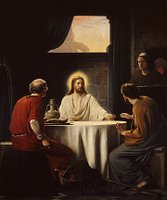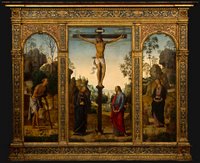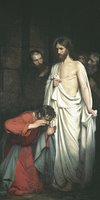Sunrise ServiceJohn 20:1-18I don't know how to love him,
What to do, how to move him.
I've been changed, yes, really changed.
In these past few days when I've seen myself
I seem like someone else.
I don't know how to take this
I don't see why he moves me.
He's a man, he's just a man.
And I've had so many men before
In very many ways:
He's just one more
Should I bring him down? Should I scream and shout?
Should I speak of love - let my feelings out?
I never thought I'd come to this - what's it all about?
Don't you think it's rather funny
I should be in this position?
I'm the one who's always been
So calm, so cool, no lover's fool
Running every show
He scares me so.
I never thought I'd come to this - what's it all about
Yet, if he said he loved me
I'd be lost, I'd be frightened.
I couldn't cope, just couldn't cope.
I'd turn my head, I'd back away,
I wouldn't want to know -
He scares me so.
I want him so.
I love him so.
Music: Andrew Lloyd Webber.
Lyrics: Tim Rice.
Show: "Jesus Christ superstar" (concept album 1970, first performed 1971).
Morning Worship ServiceIsaiah 25:6-9Psalm 118:1-2, 14-24I Corinthians 15:1-11Mark 16:1-8Of Stones and Crosses
Easter is the cornerstone of the Christian Faith. Without Sunday morning, the events of Thursday evening and Friday would have faded into oblivion. The little band of fanatics would have simply crept back into the woodwork from whence they came. Instead, we have the beginnings of a world-wide religion. But more than that we have a Faith that keeps us going in times of stress and distress. We have a Savior that warms our hearts and fills our souls with joy.
It had only been about thirty hours. And yet it seemed like an eternity. Jesus had been taken down from the cross and laid in someone's tomb nearby the cross. They had been in shock, but even so, they rememberd where they laid him. They had seen the large stone that was placed in front of the opening to the cave.

Peter and James and John and all the rest of the men had fled for their lives. The Sabbath, a Saturday much like yesterday, should have been a time of joy. It should have been a time when they went to synagogue and worshipped their God with others in the community. But they were in a foreign city. They were in a foreign place in their souls. And their hearts ached for the loss of their master, their friend, their hope.
On Sunday morning the women approached the tomb. They had come to complete a proper burial for their friend and would-be-messiah. How would they remove the stone? Dread and sorrow filled their hearts. How like women everywhere, in every time. They came simply to do what must be done. This man Jesus, who had gone beyond merely making the lame walk. He had proclaimed the forgiveness of sins and had spoken of a new life under the reign of God. But now he was dead. It was the end of a dream -- His dream -- their dream. Their dream of salvation and deliverance.
And then they looked up and the scripture says they "saw that the stone, which was very large, had ALREADY been rolled back."
Perhaps their first thought was thankfulness. After all, they did not have that dreaded obstacle in the way of doing their appointed task. But soon the grattitude turned to fear. Had something happened to the body? The body was gone! The scripture says the women were amazed. That word amazed, again it means bewildered, perplexed, astounded, surprised and confused.
They looked in the tomb. There was a young man. Who was he? Remember that Mark tells us of another young man who followed behind Jesus and the mob after he was arrested. Is this the same young man? Is this an angel as reported by Matthew and Luke? He was dressed in white. He said to them, "Do not be amazed; [bewildered, perplexed, astounded, surprised and confused] you seek Jesus of Nazareth, who was crucified. He is not here! [He is not here? Where is He then? Who has taken Him? No!] He is not here! HE IS RISEN!"
Filled with so many contradictory emotions, fear and joy, dread and hope, disbelief and wonder, shock and amazement, the women fled. The scripture simply and understatedly, says they were afraid.
Ah, but the Good News is SO good this morning. Is it not? It is so good that we can scarcely comprehend it. The stones that get in our way. That get in the way of our living a resurrected life. They are so large. They are so intimidating. They are so seemingly final, and so frightening. We keep our heads down, don't we. We keep assuming that the stone in our path is simply unmovable. This morning, we are invited -- No! We are compelled -- to look up and see the miracle of Christ. That miracle is that the stone in our life has ALREADY been rolled back.
It is no accident that the crosses we display in most of our churches are empty. Christ does not still hang on the cross. He is gone from it. The mighty act of salvation has been accomplished. It has been completed once and for ALL. The God who loved us so much, that God's only Son, God's very self, died on that cross for us -- You and Me. And now he is risen. His death at the hands of the Roman infidels was the scandal of the ages. But the empty cross is not a scandal to us. The empty cross is our symbol. It is the symbol of God's declaration. For the empty cross is God's declaration that the stone has ALREADY and FOREVER been rolled back.
I believe in resurrection because I have experienced it. Encountering a stone in my life that I could not remove on my own. Surrendering to a God who's power can move mountains (and stones). Then receiving the life God wants for me. That is the power of the resurrection. But I must, one day at a time, do as those women did on that cold Easter morning: I must continually look up, and see, and believe that the stone has ALREADY been rolled back.
Just as surely as Jesus called to his friend Lazarus to "Come out!" of his tomb, Jesus called me to come out of my tomb of sin and guilt and shame. He called me to come out to accept and love that part of me that he ALREADY accepted and loved. If I would only look up and see that that stone had ALREADY been rolled away, I could have a new life, a more abundant life. That resurrection changed my life. I thought I would never, ever forget.
But being human, I do forget, from time to time. I forget that God has accomplished the most amazing thing in the life, death and resurrection of Jesus Christ. Something cosmic, and yet personal and individual. And God is always calling me back when I encounter stones in my way. He always reminds me to stop, look up, and see that the stone has already been rolled away. Oh, if I would only see what God has accomplished. If I could only surrender to it, surrender and be changed. I would be empowered by it.
No wonder the women went away afraid. Dear God, what if it WERE true, that he was alive. What if it were true that God had rolled away the stone, not only in front of the tomb, but also in the paths to their own resurrected life? Their lives would never be the same. They weren't. And neither is mine. And neither will yours be the same.
Just as surely as Jesus called to his friend Lazarus to "Come out!" of his tomb, Jesus calls you to come out of your tomb of sin and guilt and shame. He calls you to come out to accept and love that part of you that he has ALREADY accepted and loves. If you would only look up and see that that stone had ALREADY been rolled away, you could have a new life, a more abundant life.

Surrendering to the truth and the power of the resurrection means embracing the cross. It means embracing the knowledge that there is no good excuse any more. No excuse for letting those stones get in the way. The stone has been rolled back! Now the hard work of living a resurrected life begins for each of us. Living our lives in that truth means doing courageous and mighty things in Jesus' name. And it means doing small and insignificant things in Jesus' name. Surrendering to the resurrection means letting go of all the anxiety and fear that can so easily grip us and rob us of our power that keeps us from experiencing the joy of the resurrected life. It means living our lives with "the peace that passes all understanding" in our hearts. And it means stopping each and every day, one day at a time, to look up and be reminded that the stone has ALREADY been rolled away.
Thanks be to our great God, who gives us the victory through our Lord Jesus Christ!
adapted from
The Missing Stone and the Empty Cross, by V. Gene Robinson, in
The Witness,
Tuesday, April 11, 2006
What was poor has become infinite. What is infinite was never poor. I have always known poverty as infinite: riches I love not at all. Prisons withn prisons within prisons. Do not lay up for yourselves ecstasies upon earth, where time and space corupt, where the minutes break in and steal. No more lay hold on time, Jonas, My son, lest the rivers bear you away.








